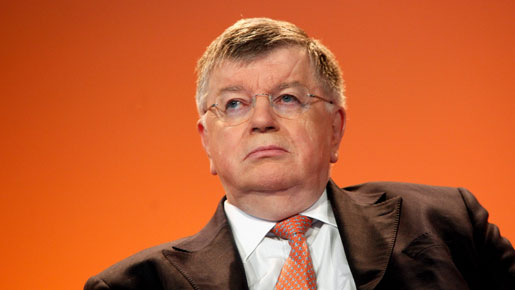
It is little wonder that one of Didier Lombard’s favourite concepts seems to be innovation: most of his career has revolved around research and development. In 1967, Lombard’s first job was in the R&D department at the very company he would head up 40 years later. There he worked on satellite, electronic and wireless componentry for France Télécom’s products.
And today, while he may have moved away from the R&D coalface, the 67 year old continues to engage in the area. In addition to his position as France Télécom chief executive, he holds senior positions in other R&D-heavy companies. He is on the board of directors as Thales, an information systems firm part-owned by the French state, and sits on the supervisory boards at the global semiconductor development company ST Microsystems and at Radiall, a French electronic component manufacturer.
Now it seems that Lombard’s penchant for developing new technologies is shaping strategy at France Télécom. Not long after replacing Thierry Breton – who went on to be France’s finance minister – as chief executive in 2005, Lombard announced an ambitious three-year strategic plan for the company.
Branded NExT, New Experience in Telecoms, the plan would redefine the boundaries for the partly state-owned telecommunications company.
As a big player in a mature market, France Télécom needed to expand beyond traditional telecommunications and into other sectors to continue growing, John Delaney, research director at analysis firm IDC, says. Although the company had begun this shift before Lombard became CEO, his NExT strategy really ‘crystallised’ the change of direction, Delaney says.
The plan kicked-off in 2006. Its main focus was on converging media and telecommunications so that, eventually, users would be able to access the same content whether they use a television, a mobile phone or a computer. Within telecoms, the company also blurred the lines between fixed line and mobile telephony. It brought both services together under its Orange brand, which today accounts for 70 percent of the company’s customers.
The company started its move into media by re-broadcasting Canal Plus TV programmes, which it distributed through its internet lines. The arrangement suited both parties. Canal Plus programmes could reach a wider audience, such as in areas without satellite reception. For France Télécom, it was an opportunity to expand beyond its traditional business.
Since then, France Télécom has moved beyond broadcasting content from other networks, and now holds exclusive rights to show some French professional football league matches. Securing the rights elevated the company’s status as a media company, and now it competes with other pay-TV providers, Delaney says.
The football contract is one example of the company’s foray beyond the boundaries of traditional telecommunications, a strategy which has been generally successful, Delaney says. Although it is still ‘early days’ for the company, France Télécom’s progress into other media puts it ahead of other long-established European telecoms firms which have tried unsuccessfully to pursue similar goals, he says.
Now ‘Orange 2012’, France Téleécom’s successor to the NExT plan, aims to continue the company’s expansion into other markets, and includes a specific focus on simplifying access to its services and growing its content production.
Spearheading ambitious initiatives is not new for Lombard. After working in France Télécom’s R&D section, he moved into a number of government roles, eventually becoming the founding chairman of France’s international investment agency and ambassador at large for foreign investment.
Born in the industrial French city of Clermont Ferrand in 1942, Lombard studied in Paris at the École Nationale Supérieure des Télécommunications. In 1989, he took up a post at the Ministry of Research and Technology as a scientific director. Two years later, he became general director for industrial strategies at the Ministry of Economy, Finance and Industry. In 1999, he was appointed to the roles in the national foreign investment agency, which he held for four years.
Lombard’s career came full circle in 2003 when he left government and returned to France Télécom as executive senior vice president in charge of technologies, strategic partnerships, and new usages.
Now as chief executive, Lombard must contend with challenges that go beyond technology. For a start, there is the company’s emerging markets strategy, which focuses on Africa. In Egypt it owns shares in the country’s most widely-subscribed mobile operator, Mobinil, and is embroiled in a dispute with another shareholder, a local company. France Télécom needs to tread gently, Delaney believes, because its behaviour in Egypt will influence how it is treated when it enters other countries on the continent. Too soft, and it will be seen as a push-over. Too hard, and it will be seen as a bully.
The company’s other big challenge for now is, of course, the recession. Business is holding up well in France, but all telecoms companies in Spain are finding things tough, and in the UK, France Télécom faces strong competition, Delaney says. Other markets where the company is present, such as Poland, are also difficult at the moment.
Despite the economic slowdown, the company was still able to present a respectable annual report for 2008, including a seven percent increase in customer numbers from the previous year. Lombard put the solid results down to the fact that telephony is increasingly an essential service rather than an expendable one.
The telecommunications industry is evolving rapidly despite the recession, Lombard said. “We are experiencing an incredible effervescence of innovation even as we face economic uncertainties,” he wrote in the annual report. “Tomorrow’s very high speed infrastructures and the associated services are going to revolutionise usages and expand the reach of telecommunications, which remains the cornerstone of our economic growth.”
And so, innovation remains a top priority for Lombard. “This means continuing our drive for innovation, focusing even more than in the past on the simple use of our products and services,” he told shareholders.

